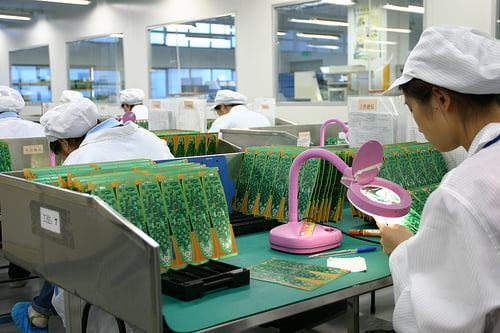
Electronics Industry and Civil Society discuss labour rights
Never before did so many electronics producers and civil society organizations meet to discuss labour issues in the electronics industry. Both recognize that the high demand for consumer electronics, like computers and mobile phones, has had consequences for workers in the industry and want to improve labour rights.
At this important round table, electronics companies, trade unions and labour rights organisations discuss current labour issues in the global electronics industry. The organisers are challenging the electronics industry as well as civil society to come up with strategies that ensure decent work. A range of speakers at the round table will present their views on more effective alternatives to the traditional CSR approaches of the electronic industry.
The corporate sector recognizes that the high demand for consumer electronics, like computers and mobile phones, has consequences for workers in the industry, in terms of excessive overtime, for example. Now, the sector is hit hard by the economic crisis and dwindling demand and again workers are bearing the consequences. makeITfair and GoodElectronics call upon the industry to adopt strategies that work, for workers.
Poor working conditions and environmental damage are rampant in the production of computers, mobile phones and other electronic products. Many factors contribute to this situation, including the complicated product chain, the high percentage of outsourcing, rapid product developments, lack of unions, as well as weak implementation of (inter)national labour law. Five years ago, electronics companies got together to develop a voluntary sector code. This initiative of the Electronic Industry Citizenship Coalition (EICC) may be laudable in it self, but stakeholders identify weaknesses in the EICC code and criticize its ineffective implementation. Structural involvement of workers and local stakeholders in the code’s development, implementation and independent verification has been lacking.
Should a common code of conduct for the electronics industry be developed? How to involve workers and other stakeholders? What makes a genuine multi stakeholder process? How to organise collaboration among supply chain actors? How can companies set-up effective in-factory workers training? These and other questions are at the centre of the discussion.
Participants
Among the participants are representatives of the Electronic Industry Citizenship Coalition (EICC), the Global e-sustainability Initiative (GeSI), and individual companies – brand names companies like Philips and HP, as well as suppliers such as Flextronics. Further, the International Labour Organisation (ILO), the International Metalworkers’ Federation, the European Metalworkers’ Federation, trade unions and labour rights NGOs from production countries in the South as well as the North will participate
Related news
-
 The hidden human costs linked to global supply chains in ChinaPosted in category:News
The hidden human costs linked to global supply chains in ChinaPosted in category:News Joshua RosenzweigPublished on:
Joshua RosenzweigPublished on: -
 Major brands sourcing from China lack public policies on responsible exitPosted in category:News
Major brands sourcing from China lack public policies on responsible exitPosted in category:News Joshua RosenzweigPublished on:
Joshua RosenzweigPublished on: -


